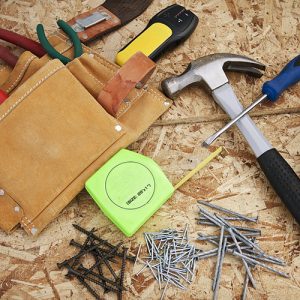 There’s nothing more satisfying than seeing the results of a do-it-yourself (DIY) project you’ve been working on – but are you making electrical safety a top priority when you power up the necessary tools? These tips will remind you to always put safety first!
There’s nothing more satisfying than seeing the results of a do-it-yourself (DIY) project you’ve been working on – but are you making electrical safety a top priority when you power up the necessary tools? These tips will remind you to always put safety first!
Before starting on a DIY task, acquaint yourself with your home’s electrical system. Learn how to turn off the power to the circuit, as well as how to test wires before touching them to make sure the power is off. Also learn where cables are in your wall to avoid drilling, nailing or screwing things into cables hidden in the wall.
When working on any sort of appliance, unplug it first to avoid risks like electrocution. Other ways to avoid electrocution from household voltages while working on a DIY project are:
- Wear rubber-soled shoes or boots when working with electrical circuits.
- Use tools like pliers, wire strippers, and screwdrivers that have rubber-coated handles.
- Always use good quality tools to reduce risk of accidents.
- Never touch plumbing or gas pipes.
When working with power tools, always follow safe practices. Most power tool-related electrocutions occur when equipment comes in contact with live electrical wires while being used. Before using any power tools, check that the cord and plug are in good condition. If you can see signs of damage (such as frayed wires) get the equipment repaired before using it or replace it if it cannot be fixed. And always watch out for the power cord so you don’t accidentally cut through or trip over it.
Personal protective equipment that will keep you safe during a DIY project are safeguards for tools, safety goggles, hearing protection, dust masks and gloves.
Most importantly, remember to never attempt a project beyond your skill level. If you’re not 100 percent confident you know how to proceed with a project, hire a qualified, licensed electrician to tackle electrical projects in your home.
“Most folks do not have the training or experience needed to safely perform home electrical work,” said Jon Elkins, vice president of safety, training and compliance at Indiana Electric Cooperatives. “Working with electricity requires thorough planning and extreme care. Cutting corners can be a costly — and deadly — mistake.”
Remember: there’s no shame in asking for help! Contact your local electric cooperative if you ever have any questions about who to contact about electrical safety.
DIY Electrical Safety Checklist
DIY projects aren’t the only thing you can do yourself. Answer these questions to make sure your home is as electrically safe as it should be.
Outlets and Light Switches:
- Are your light switches and outlets warm to the touch, discolored or making sounds, such as buzzing or crackling? If so, get them fixed.
- Do plugs fit snugly into all outlets?
- Do you have enough switches and outlets?
- Is your furniture arranged in such a way where you don’t have to rely on extension cords?
Extension Cords:
- Have you used any extension cords for more than 30 days? Remember extension cords should only be used as a temporary measure.
- Do your extension cords display wires, cracks, frays or other damage? If so, get them fixed.
- Do you have any cords placed where they can be pinched or tripped over? If so, relocate them.
- Are any extension cords stapled or nailed to the wall or ceiling? This is a safety hazard.
- Does your extension cord feel hot to the touch? If so, replace it.
GFCIs and AFCIs:
- Do all the outlets in and around your kitchen and bathroom have ground fault circuit protection (GFCIs)?
- Have you replaced all your standard circuit breakers with safer arc fault circuit interrupters (AFCIs)? AFCIs are better able to detect dangerous electrical conditions.
Smoke and Carbon Monoxide (CO) Detectors:
- Are smoke detectors installed on every floor of the home, in every bedroom and outside of every sleeping area? If not, install them as soon as possible.
- Do you have carbon monoxide (CO) detectors installed on every floor of the home and outside of every sleeping area? If not, install them as soon as possible.
- Have you tested your smoke and CO alarms in the last 30 days? Doing so helps ensure you and your family stay safe.
DIY Safety Tips
If you do decide to start a do-it-yourself electrical project, consider the following important safety tips before getting to work:
- Try to learn about your home’s electrical system so you can safely navigate and maintain it.
- Never attempt a project beyond your skill level. Knowing when to call a professional may help prevent electrical fires, injuries and fatalities.
- Always turn off the power to the circuit you plan to work on by switching off the circuit breaker in the main service panel.
- Be sure to unplug any lamp or appliance before working on it.
- Test the wires before you touch them to make sure the power has been turned off.
- Never touch plumbing or gas pipes when performing a do-it-yourself electrical project.




